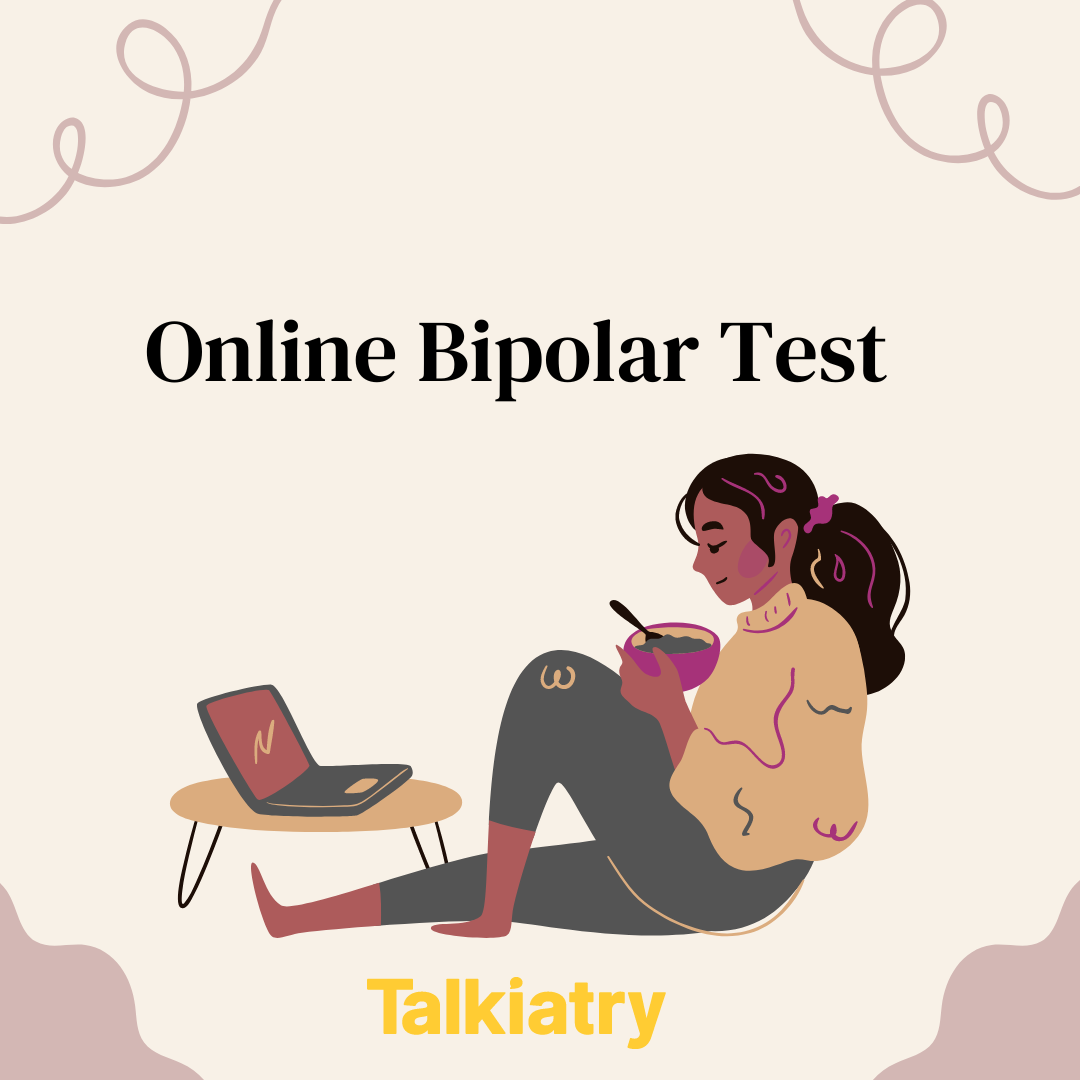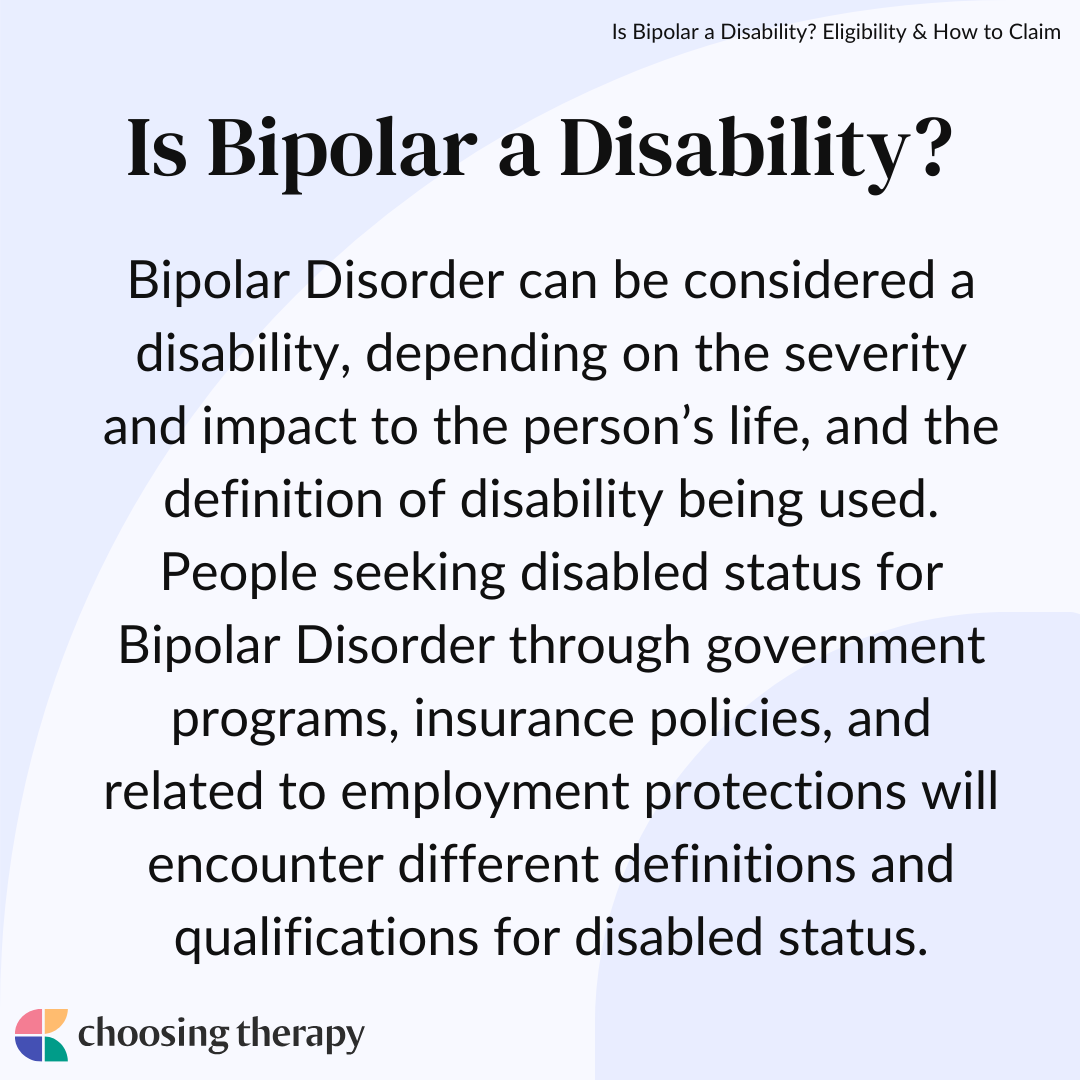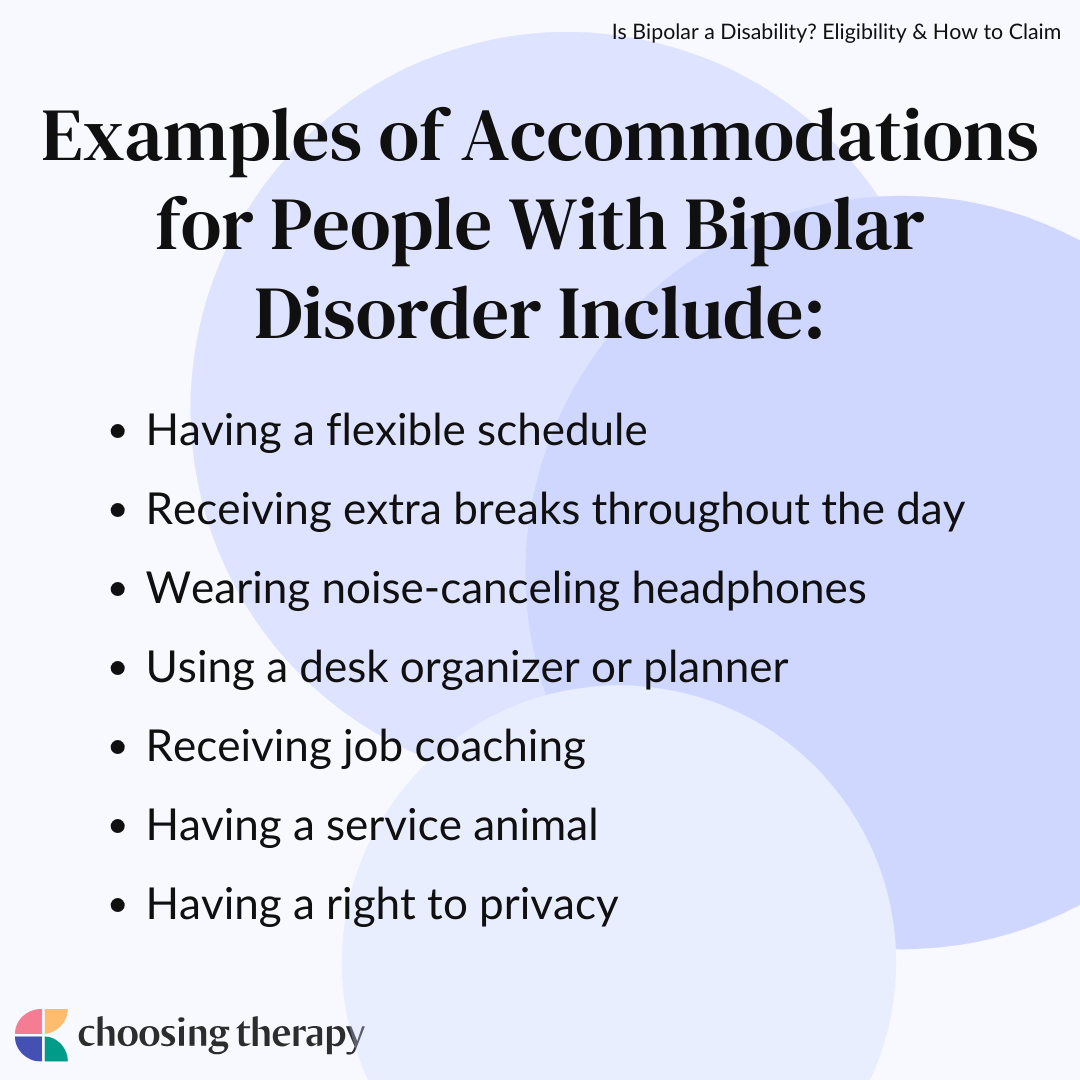Bipolar Disorder can be considered a disability, depending on the severity and impact to the person’s life, and the definition of disability being used. People seeking disabled status for Bipolar Disorder through government programs, insurance policies, and related to employment protections will encounter different definitions and qualifications for disabled status.
Online Psychiatry Covered By Insurance Talkiatry can match you with a real psychiatrist who takes your insurance and is seeing new patients. They’re in-network with major insurers and offer medication management. Get started with a short online assessment
Does the Americans With Disabilities Act (ADA) Consider Bipolar Disorder a Disability?
The ADA considers bipolar disorder to be an episodic impairment, meaning it manifests with symptoms that appear episodically. However, the ADA also outlines “an impairment that is episodic or in remission is a disability if it would substantially limit a major life activity when active.” 42 U.S.C. 12102(4)(D). Therefore, since bipolar disorder limits brain function, it is covered under the ADA.1
What Are My Rights Under the ADA?
The ADA is intended to protect people with disabilities from being discriminated against in everyday activities, including the workplace and in government programs such as public education and other public services. The ADA prohibits employers from discriminating against people with disabilities when it comes to hiring practices, promotional opportunities, training, pay, and social activities.2
The ADA, through the Department of Justice, Equal Employment Opportunity Commission (EEOC), and various other agencies, conducts investigations, and issues regulations and guidance to explain the law and enforce it. Specifically, employers must make reasonable accommodations for employees with disabilities. People with disabilities who experience discrimination have the ability to file complaints through the appropriate agency to address the issue.
Examples of accommodations for people with bipolar disorder include:
- Having a flexible schedule
- Receiving extra breaks throughout the day
- Wearing noise-canceling headphones
- Using a desk organizer or planner
- Receiving job coaching
- Having a service animal
- Having a right to privacy
Can You Work With Bipolar Disorder?
Yes, it is possible to work with bipolar disorder; however, the symptoms of bipolar disorder may make it difficult to maintain employment. The sometimes severe shifts in mood can cause significant distress in life and work, making it hard or impossible to complete tasks, remain focused, keep organized, or think rationally. Psychiatric hospitalizations and intensive treatment may also impact the ability to retain employment.
Your ability to retain employment with bipolar disorder may be closely linked to the severity of symptoms and your cognitive performance. Severe symptoms impacting cognitive functioning greatly lower the likelihood of retaining employment. In some studies, about 43% of patients remained employed after the initial onset of symptoms.3 It was common to find that people who remained employed moved to less demanding jobs.4
Types of Federal Disability Benefits for Bipolar Disorder
If the episodic symptoms of bipolar disorder are preventing you from being able to work, you may be entitled to certain federal benefits depending on your employment history, income, and severity of symptoms. Federal benefits include Social Security Disability Insurance (SSDI), Supplemental Security Income (SSI), and Medicare coverage. Each of these has its own eligibility requirements and benefits, and can potentially be combined.
Supplemental Security Income (SSI) for Bipolar Disorder
SSI is available to adults and children with a medically determinable impairment that prevents them from gainful employment (earning more than $1470 a month on average for 2023), and is expected to last a year or more, or result in death. The Social Security Administration (SSA) also limits assets to less than $2000 for individuals, and $3000 for couples, in order to qualify for benefits.5
Because the disability has to be medically determinable, a physician must have made the diagnosis and determined that you would be unable to work. Sometimes the SSA will require a medical evaluation by a physician of their choosing to confirm your impairment. The SSA requires significant personal, financial, employment, and medical information to apply for benefits.
Social Security Disability Insurance (SSDI) and Bipolar Disorder
SSDI is available to adults who have paid into government benefits through their employment for at least 10 years (40 work credits). You accumulate a work credit for every quarter year you pay social security taxes through earned income. The SSA will determine your disability first based on if your impairment prevents you from doing the work you were previously doing, and then if it prevents you from doing other gainful employment opportunities.6
Because of bipolar disorder’s episodic nature, it may be difficult to prove that your condition qualifies as a disability, despite support from your healthcare providers. It may also be difficult if your work history is inconsistent because of symptoms of bipolar disorder. If initially denied for SSDI benefits, you have the option to appeal that decision. If denied again, you have the option to request a hearing before a judge to appeal the decision.
Medicare Access for Bipolar Disorder
Medicare is available to people over 65, and those who have been receiving SSDI payments for 24 months. Exceptions are made for those with ESRD or ALS. If you have bipolar disorder and are under 65, you automatically qualify for Medicare if you have been receiving SSDI payments for 24 months or when you turn 65, whichever comes first. If you fit those criteria, Medicare can help pay for medical treatment for bipolar disorder as well as your other healthcare needs.7
Online Psychiatry Covered By Insurance Talkiatry can match you with a real psychiatrist who takes your insurance and is seeing new patients. They’re in-network with major insurers and offer medication management. Get started with a short online assessment
Specific Eligibility Criteria for Bipolar Disorder
In order to qualify for SSDI benefits, the SSA must determine that your condition qualifies as a disability. They do this by evaluating the medical information you submit to them from your medical providers, determining if your condition prevents you from doing work you previously did, and then determining if your condition prevents you from doing any type of work at all. Additionally, you must have ten years of work history paying into social security taxes.
Due to the episodic nature of bipolar disorder, it may be difficult to prove your condition prevents you from obtaining gainful employment. The SSA may require you to be evaluated by a physician of their choosing. It may be that the times of stability that come with bipolar disorder are enough to suggest that you would be able to reach gainful employment levels. There are options for appeal if you are denied benefits.
How to Apply for Disability With Bipolar Disorder
To apply for SSDI benefits, you need to complete an application through the Social Security Administration (SSA). You can start the process over the phone by calling 1-800-772-1213, and they will mail you the paper application. You can also apply online at https://www.ssa.gov/apply, which will create an account for you to track the application’s progress. An interview is part of the application process. It can take anywhere from 3 to 6 months for a decision to be made.
If initially denied, the appeal process can take six months to two years, depending on how many appeals are required. Because of the complexity of the appeals process, it is recommended that legal help be accessed if initially denied. While it is not necessary to have legal assistance filing the initial application, some people opt for this for the added peace of mind.
Required Documentation for Bipolar Disorder
You will need to submit paperwork from your healthcare providers outlining your condition, documentation of your work history, and your household and demographic information. Specifically, you will need to have psychiatric evaluation results, physician notes from treatment related to your bipolar, a list of your medication, dates of visits related to your bipolar diagnosis and treatment, and any clinical notes from treating providers that highlight impairment significant enough to keep you from working.
You can request notes, results, or your chart from your treating providers. There may be a small administrative fee for obtaining these, depending on your provider’s policies. If you have had any worker’s compensation claims related to your bipolar disorder, include copies of paperwork received related to that as well.
Application Channels & Tips
The Social Security Administration (SSA) is where to apply for Social Security Disability Insurance (SSDI) benefits. Their website is www.ssa.gov, and you can locate an online application there, or find your local office location to apply in person if desired. You can also start the application process over the phone by calling 1-800-772-1213.
To find legal help filing or appealing an SSDI application, you can go to the Legal Services Corporation website at www.lsc.gov/about-lsc/what-legal-aid/i-need-legal-help and search for your geographical area in their legal aid finder tool.
How to Strengthen Your Bipolar Disorder Claim
You can strengthen your SSDI claim by thoroughly describing how your bipolar disorder affects your ability to work in the application and interview process. Doing things like detailing manic and depressive episodes and how they impacted employment, tracking and describing your mood changes and how they impact your ability to work or your safety at work, providing details on any hospitalizations and treatment received and how this has impacted work.
Gathering Medical Evidence for Bipolar Disorder
It is important to obtain and provide any and all medical records related to your claim. The Social Security Administration can make a decision based solely on the provided records, however, if they do not determine the records are sufficient, they can require you to visit with a doctor they appoint. Providing enough information on the front end will greatly improve your chances of your claim receiving approval.
Since bipolar disorder is episodic, when you visit with an SSA-referred doctor, they may not gain a full appreciation for your condition. Your regular healthcare provider would likely be more familiar with your condition and specific nuances of your bipolar disorder and how it has impacted your life.
Personal & Professional Testimonies in Bipolar Disorder Claims
As part of gathering employment information, ask if your previous employers are willing to provide you with testimonies on the impact bipolar disorder has had on your employment and ability to work. These can give a good perspective on the impact of your bipolar on your life to the SSA. Personal testimonies can help as well, if those in your life have seen how your bipolar has impacted your ability to function.
Help For Bipolar Disorder Online Psychiarty For Bipolar Disorder – Talkiatry can match you with a real psychiatrist who takes your insurance and is seeing new patients. They’re in-network with major insurers and offer medication management. Most psychiatry visits cost patients $30 or less* Free Assessment Talk Therapy – Get help from a licensed therapist that has expertise with bipolar. BetterHelp offers online therapy starting at $65 per week. Visit BetterHelp *Includes copayment, deductible, coinsurance, and $0 Visits. Excludes no shows.
Understanding the Costs of Bipolar Disorder Disability Claims
While the application for SSDI does not have a cost, obtaining records and obtaining legal representation can have a cost. Healthcare providers are allowed to charge a reasonable administrative fee for providing health records to patients, which can sometimes be as high as $50. Additional psychiatric evaluations may be necessary to establish medical evidence for the claim, and this would be subject to normal charges for services.
Lawyers have limits on what they can change, when providing representation for SSDI claims. Generally, a lawyer cannot charge you more than 25% of past-due benefits or $7200, whichever is lower. Typically, disability lawyers will recoup this fee from your initial benefit payment.
Risks of Self-Representation in Bipolar Disorder Claims
Representing yourself for SSDI claims is your right; however, bipolar disorder creates its own unique challenges in self-representation. Depending on your mood over the course of the application process, your cognitive functioning may be impaired during some or all of the process, leading to errors in filing or possible denial. If you feel uncomfortable representing yourself, you can hire legal counsel to represent you through the process and file the initial claim if you so choose.
Post-Application Process for Bipolar Disorder
After you file your application for SSDI, it is likely that the SSA will set up an appointment with you for an interview either over the phone or in person at a local office. You may need to consider what type of support you will require to complete this interview, whether that is having someone close to you with you during the interview, or hiring legal representation.
If the SSA requires you to see a physician, you may consider bringing copies of your medical records with you to that appointment, and what support you may need with you as well. They may require a psychological evaluation specifically for bipolar disorder claims, which you would have to cooperate with if you want to pursue SSDI benefits.
How to Handle the Denial of Bipolar Disorder Disability Claims
If your initial claim is denied, it is imperative that when you appeal, you provide additional and comprehensive medical information. Given the episodic nature of bipolar disorder, it could be that the medical documentation initially provided did not adequately outline the impact bipolar disorder has on your ability to work.
Common Reasons for Denial
Commonly, bipolar disorder claims are denied because the medical documentation does not adequately describe a significant enough limitation on areas of mental functioning if the condition has not been serious and persistent for at least two years. Bipolar disorder, because of its episodic nature, may not meet the serious and persistent requirement, so would only be approved if there is significant impairment to mental functioning.8
Other common reasons for denial could be that there has been no specialized treatment received for bipolar disorder, or that there has been non-compliance with treatment. Sometimes this is a conclusion reached because of a lack of sufficient medical documentation. Additionally, the claim will likely be denied if you are working.
Appeals Process
If you have to submit an appeal, you will be required to do so in writing or online. The SSA will review all previous documentation as well as any new documentation you submit or that they request and obtain. Take the opportunity to submit any additional medical documentation supporting your claim.
If they deny the appeal, you can request a hearing by an administrative law judge. It is at this level of appeal that obtaining legal representation is highly recommended. At the hearing, the judge will explain the issues in your case and question you and any witnesses you bring to the hearing. You or your representative may also be able to ask questions. A determination is made in writing after the hearing.
If the hearing results in a denial, you do have the right to request a review by an appeals council, and finally file a civil action in federal court for review. If ultimately denied at the federal level, it will be a final decision on the claim. It is best to have legal representation on appeals and follow their direction for the process.
Bipolar Disorder Treatment Options
It is important to access treatment for your bipolar disorder before and throughout the SSDI process. You can be denied for not seeking appropriate treatment for your condition, and it will be necessary to have medical documentation that specialized treatment has been accessed and has not resulted in improvement enough to regain the ability to work. This likely includes psychiatric care with pharmaceutical intervention, or documentation as to why this is not a viable option.
Online Psychiatry Covered By Insurance Talkiatry can match you with a real psychiatrist who takes your insurance and is seeing new patients. They’re in-network with major insurers and offer medication management. Get started with a short online assessment
Medication & Mood Stabilization
There are some commonly prescribed medications for bipolar disorder, such as lithium, antipsychotics, and antidepressants, which would be expected to be considered in treatment or tried without significant improvement for an SSDI claim.
Common medications used to treat bipolar disorder include:
- Mood stabilizers: Mood stabilizers are drugs prescribed to reduce the severity of mood swings to maintain control and manage mood. Lithium is commonly prescribed for bipolar disorder. They work to restore the neurochemical balance of the brain.
- Antidepressants: Antidepressants are drugs prescribed to manage and control depression. The most common are SSRIs, which target serotonin in the brain and work to raise the amount present.
- Antipsychotics: Antipsychotics are prescribed to manage psychotic symptoms such as delusions and hallucinations. In bipolar disorder, they work to reduce the action of dopamine to manage symptoms of mania.
Psychotherapy & Support
Treatment recommendations for bipolar disorder typically include psychotherapy as a vital component to the treatment plan. Cognitive behavioral therapy, Interpersonal and social rhythm therapy, and family therapy are typical approaches.
Common therapy options for bipolar disorder treatment include:
- Cognitive behavioral therapy(CBT): CBT for bipolar disorder really works to identify triggers and manage stress and symptoms of bipolar disorder. CBT works to replace unhealthy thinking and behavior patterns with healthy ones.
- Interpersonal and social rhythm therapy(IPSRT): Interpersonal therapy can help you learn to cope with stress and stressful events through social factors. Additionally, reestablishing social rhythms in daily life can help alleviate some symptoms of both mania and depression by ensuring routine is kept.
- Group therapy: Group therapy helps to socialize treatment in a supportive environment. It allows you to connect with others in a supportive way to facilitate change.
- Family Therapy: Family therapy is important to those with bipolar disorder who are part of a family household, or rely on family for support. Family therapy works to help support change in the individual and change in the family to cope with stressors in healthy and supportive ways.
- Substance abuse treatment: Substance use disorder is not uncommon as a co-occurring condition with bipolar disorder. Substance use can exacerbate symptoms of bipolar, and even trigger or worsen depression and mania. Substance abuse treatment focuses on the reduction or elimination of the use of alcohol or other drugs.
Alternative Treatments
Alternative therapies do exist for bipolar disorder, and should only be considered with physician recommendation. ECT has some proven applications for drug-resistance bipolar disorder.9 TMS has shown to be effective with depression symptoms and may be appropriate for people with Bipolar II disorder. These options would be considered if other therapies were no longer viable options due to effectiveness or other factors.
Where to Seek Professional Help for Bipolar Disorder
Finding a therapist does not have to be hard, and there are many ways to find a therapist. You can start with an online directory, or even call your insurance company to get a referral to an in-network provider. If you’re looking into disability for bipolar disorder, it is likely you are already connected with a provider, but if you are unhappy with your therapist or are not seeing someone regularly, it is important to find someone that works for you, and you can realize some of the benefits of therapy with.
In My Experience
Education is just the first step on our path to improved mental health and emotional wellness. To help our readers take the next step in their journey, Choosing Therapy has partnered with leaders in mental health and wellness. Choosing Therapy may be compensated for marketing by the companies mentioned below. Online Psychiatry For Bipolar Disorder Talkiatry – Our Psychiatrsts Can Diagnose Your Condition, Prescribe Medication, And Monitor Your Progress. Most psychiatry visits cost patients $30 or less* Free Assessment Talk Therapy Online-Therapy.com – Get support and guidance from a licensed therapist. Online-Therapy.com provides 45 minute weekly video sessions and unlimited text messaging with your therapist for only $64/week. Get started Starting Therapy Newsletter A free newsletter for those interested in learning about therapy and how to get the most benefits out of therapy. Get helpful tips and the latest information. Sign Up DBT Skills Course Jones Mindful Living Dialectical Behavior Therapy (DBT) is a popular treatment for BPD. Learn DBT skills with live weekly classes and online video courses for only $19 per month. Free One Week Trial Choosing Therapy Directory You can search for therapists by specialty, experience, insurance, or price, and location. Find a therapist today. *Includes all types of patient cost: copayment, deductible, and coinsurance. Excludes no shows and includes $0 VisitsAdditional Resources
Online Bipolar Test A few questions from Talkiatry can help you understand your symptoms and give you a recommendation for what to do next. Best Online Psychiatry Services Online psychiatry, sometimes called telepsychiatry, platforms offer medication management by phone, video, or secure messaging for a variety of mental health conditions. In some cases, online psychiatry may be more affordable than seeing an in-person provider. Mental health treatment has expanded to include many online psychiatry and therapy services. With so many choices, it can feel overwhelming to find the one that is right for you.









